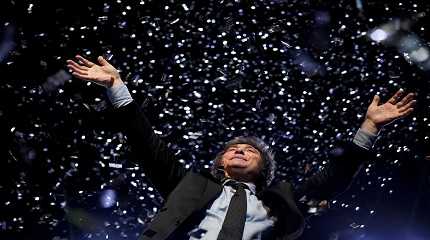
BUENOS AIRES, Argentina (AP) — Argentina could take an unprecedented turn Sunday as frustrated voters weigh handing the presidency to an anti-establishment, right-wing populist who has shaken up the political system and pledges to drastically overhaul the state.
Javier Milei, a self-described anarcho-capitalist who admires former U.S. President Donald Trump, sent shockwaves through the nation after receiving the most votes in August primaries. The economist and first-year lawmaker has said he will slash public spending, halve the number of government ministries, eliminate the central bank and replace the local currency with the U.S. dollar.
He first made a name for himself with angry tirades blasting what he calls the “political caste” on television, and has gained support from Argentines struggling to make ends meet amid annual inflation of 140% and a rapidly depreciating currency. His platform also calls for reshaping Argentine culture, and he casts himself as a crusader against the sinister forces of socialism at home and abroad.
“Argentina is in for a wild ride,” Benjamin Gedan, director of the Latin America program at the Washington-based Wilson Center, said. “The most likely scenario is rather worrisome, a polarized society, divided congress, combative and inexperienced leader and an economy hurtling toward an abyss.”
Polls open at 8 a.m. (1100 GMT) and close 10 hours later. Voting is conducted with paper ballots, making the count unpredictable, but initial results were expected around four hours after polls close.
Pre-election polls, which have been notoriously unreliable, gave Milei a slight lead that would be insufficient to avoid a runoff in November. In order to win outright, a candidate has to receive 45% of the vote, or 40% and a 10-point difference with the runner-up.
Whatever the results, Milei has already inserted himself and his libertarian party into a political structure dominated by a center-left and a center-right coalition for almost two decades.
Former Security Minister Patricia Bullrich of the main opposition coalition battled Milei for right-wing support and argued her team had the necessary connections and experience negotiating legislation to bring about the change the country needs.
Economy Minister Sergio Massa, a leading figure in the center-left administration in power since 2019 and in second place in most polls, sought to rally support despite the fact inflation has soared on his watch. He blamed recent troubles on a historic drought that decimated exports and said he prevented things from getting worse.
“The worst is over,” Massa often said at his rallies.
On the streets of Argentina, citizens are skeptical of that, and they are bracing for impact. Those with any disposable income are snapping up goods in anticipation of a possible currency devaluation. The day after the primaries, the government devalued the peso nearly 20%.
Argentines were also buying dollars and removing hard currency deposits from banks as the peso accelerated its already steady depreciation.
Alfredo Adrián Fernández, a 36-year-old who works in his family’s bakery in the outskirts of Buenos Aires, is fed up.
“We’re tired of one day waking up and beef is 3,000 pesos and in a few hours it’s 4,000 pesos. The Argentine people are exhausted by their salaries getting devoured by inflation,” he said.
Massa and Bullrich focused much of their firepower in the campaign’s final days on warning voters against electing Milei, painting him as a dangerous upstart. Massa in particular said that Milei’s plans could have devastating effects for social welfare programs, education and health care. The health, education and social development ministries are among those Milei wants to extinguish.
Milei characterized his two main opponents as part of the entrenched and corrupt establishment that brought South America’s second-largest economy to its knees. That message resonated among many Argentines who watched their economic prospects wither under successive administrations in which both Massa and Bullrich served.
Milei also railed against what he called the “socialist agenda.” He opposes sex education, feminist policies and abortion, which is legal in Argentina. He called the notion of social justice “an aberration” and disputed that humans have had a role in causing climate change.
“What madness are we living in? The madness of stupid political correctness where, basically, if you don’t recite the ‘cool socialism,’ if you aren’t ‘woke,’ then you’re violent, you’re a danger to democracy,” he said in a television interview last month.
As a rising star in the global culture wars, Milei received support from several likeminded leaders, including Brazil’s former far-right president, Jair Bolsonaro. Bolsonaro’s lawmaker son, Eduardo, planned to follow the election from Milei’s campaign headquarters as were several leaders of Spain’s far-right Vox party.
“We’re a global phenomenon,” Milei said in his closing rally Wednesday, weeks after former Fox News host Tucker Carlson admiringly interviewed him.
The election comes at a time when several Latin American countries have seen elections marked by anti-incumbent sentiment and political outsiders amid general discontent over the economy and crime. Daniel Noboa, an inexperienced politician who is the heir to a banana fortune, won the presidency in Ecuador earlier this month.
Like Trump and Bolsonaro, Milei already was casting doubt on the electoral system. He said fraud cost him as many as five points in the primaries, although he never filed any complaints in court. Political analysts warned that Milei could be setting the stage to question the results of Sunday’s election.




